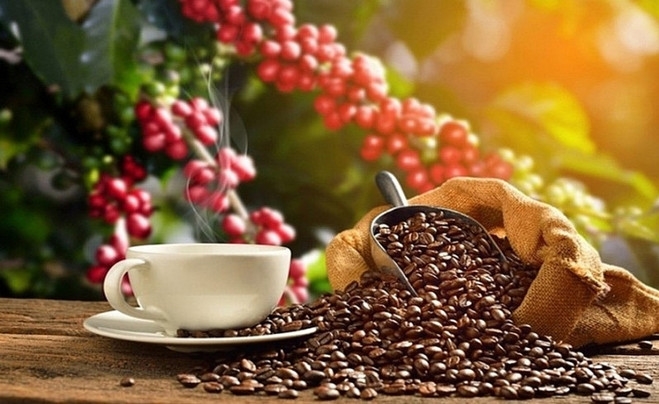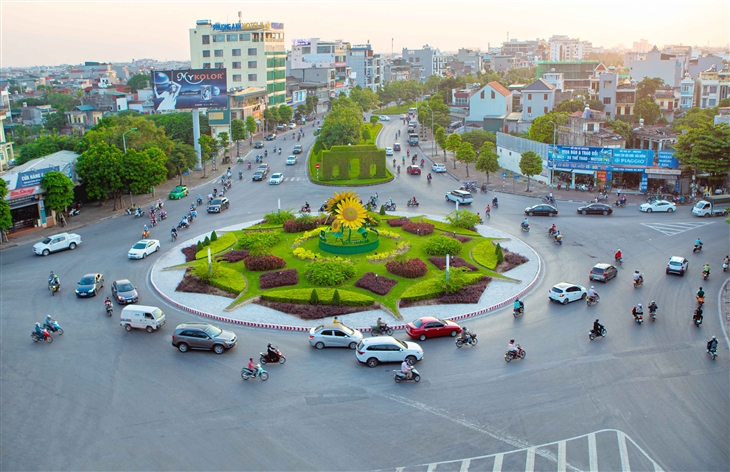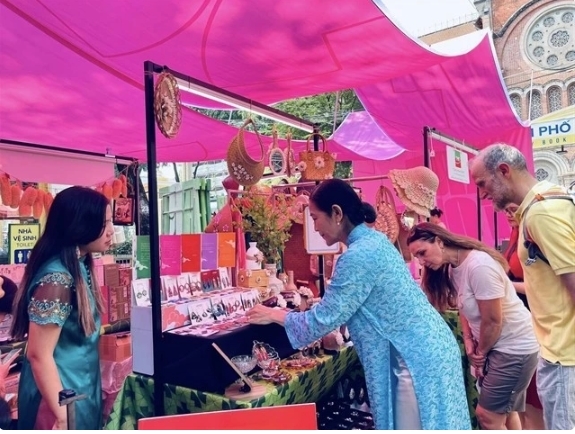Coffee exports receive positive signals from EU
Tuesday, May 27,2025
AsemconnectVietnam - EU is the largest market for Vietnamese coffee. The EU ranks Vietnam in the 'low risk' group for deforestation, helping businesses increase their competitiveness in this market.
Many major markets in EU increase their purchases of Vietnamese coffee
According to data from Customs Department (Ministry of Finance), as of mid-May 2025, Vietnam exported 736,583 tonnes of coffee with a turnover of 4.2 billion USD. Although it decreased by 5.5% in volume, thanks to high average coffee export price, the turnover increased by 56% compared to the same period last year. Accordingly, the average coffee export price in the period reached 5,709 USD/tonne, an increase of 65% compared to 3,442 USD/tonne in the same period last year.
In terms of markets, Vietnam's 10 largest coffee export markets had a total turnover of 2.53 billion USD, accounting for 63% of coffee export value in the first 4 months of 2025. All 10 markets grew strongly compared to the same period last year.
Among the 27 member countries of European Union (EU), there were 3 large markets that recorded outstanding growth in coffee exports in the first 4 months of 2025. Of which, Germany is Vietnam's largest coffee export market with 628 million USD, up 97% over the same period last year. Coffee export turnover to Italy also increased by 33.8% over the same period last year, to 307 million USD; Spain increased by 51.3% over the same period last year, reaching 292 million USD.
EU has issued Deforestation Prevention Regulation (EUDR). According to regulations, the EU will ban the import of 7 groups of goods into the EU if the production of these goods causes deforestation, including coffee. Good news for this item when the European Commission (EC) announced a national classification system according to the level of risk within the framework of the EU's EUDR Regulation, accordingly, 140 countries, including the US, India, Thailand, Vietnam, are classified in the "low risk" group.
Vietnamese coffee exporting enterprises must still fully comply with all EUDR requirements. In particular, enterprises exporting to EU market are not exempted from the responsibility of assessing and making the supply chain transparent. Vietnamese enterprises must still prepare complete documents and data, especially the traceability system to geographical coordinates.
However, exporting enterprises have the advantage of reducing frequency of compliance checks. Specifically, for products from countries in the “low risk” group, only 1% of shipments will be randomly selected for inspection by EU authorities. Meanwhile, countries classified as “standard risk” and “high risk” are 3% and 9%, respectively. In addition, businesses will reduce the risk of being suspended or investigated. This means that businesses from “low risk” countries will be less suspicious, helping to shorten customs clearance times and costs. Enterprises increase competitiveness
As a coffee exporting enterprise, in which the main market is the EU, speaking with reporters of the Industry and Trade Newspaper, Mr. Le Duc Huy - Chairman of Board of Members of Dak Lak 2-9 Import-Export Company Limited (Simexco Daklak) - said that in the first 4 months of 2025, the enterprise's coffee exports increased by about 60 - 70% because the export volume did not decrease, while export price of coffee increased sharply. The quality of Vietnam's Robusta coffee is also rated higher than other countries.
The EUDR regulation is a big challenge but also an opportunity to restructure coffee industry in a sustainable and professional direction. To meet EUDR requirements, Mr. Le Duc Huy said that with partners in the supply chain, enterprises still stick to growing areas, produce coffee with sustainable certification, build digital maps, and trace the origin to each farmer.
Regarding quality strategy, the enterprise still accompanies supply chain to create Vietnamese specialty coffee products, especially Robusta coffee to serve new, higher and more demanding needs for flavor and taste of customers. Vietnam's classification in the "low risk" group for deforestation helps reduce the burden of post-inspection and creates a competitive advantage.
According to Mr. Tran Van Cong - Vietnamese Agricultural Counselor in Belgium and the EU, Vietnam's classification in the "low risk" group is a positive result of cooperation efforts between two sides in recent times. Especially within the framework of Voluntary Partnership Agreement on Forest Law Enforcement, Governance and Trade (VPA/FLEGT), as well as coordinated activities on environmental protection and sustainable development.
In light of new announcement, EUDR - Forestry Network also recommends that the Government of Vietnam maintain and enhance its "low risk" status by continuing to implement forest protection policies, strengthening land use management and monitoring and promoting afforestation and forest restoration programs. At the same time, support businesses and farmers, provide training and technical assistance to help them meet requirements of EUDR, especially in collecting and managing data on product origin. In addition, strengthen international cooperation, work closely with the EU and international organizations to receive technical and financial support in implementing the requirements of EUDR.
For businesses, EUDR - Forestry Network proposes to establish a supply chain management system, ensuring traceability of products from raw material areas to finished products, using digital technology and geographic data...
According to Vietnam Coffee - Cocoa Association, Vietnam is the world's largest producer of Robusta coffee. EU's import demand is very large and the supply is almost entirely from Vietnam's Robusta coffee. Vietnamese Robusta coffee has a relatively strong and irreplaceable position in the world market. Among commodity groups subject to EUDR Regulation, coffee is the most affected because this market accounts for nearly 40% of the industry's total export turnover.
EUDR will apply to large businesses from the end of 2025 and to small businesses from June 2026. If they do not comply, businesses can be fined up to 4% of their revenue in the exporting EU member country. Vietnam's "low risk" classification not only helps reduce the compliance burden for Vietnamese businesses, but also demonstrates Vietnam's strong commitment to forest protection and sustainable development.
Source: Vitic/ congthuong.vn
According to data from Customs Department (Ministry of Finance), as of mid-May 2025, Vietnam exported 736,583 tonnes of coffee with a turnover of 4.2 billion USD. Although it decreased by 5.5% in volume, thanks to high average coffee export price, the turnover increased by 56% compared to the same period last year. Accordingly, the average coffee export price in the period reached 5,709 USD/tonne, an increase of 65% compared to 3,442 USD/tonne in the same period last year.
In terms of markets, Vietnam's 10 largest coffee export markets had a total turnover of 2.53 billion USD, accounting for 63% of coffee export value in the first 4 months of 2025. All 10 markets grew strongly compared to the same period last year.
Among the 27 member countries of European Union (EU), there were 3 large markets that recorded outstanding growth in coffee exports in the first 4 months of 2025. Of which, Germany is Vietnam's largest coffee export market with 628 million USD, up 97% over the same period last year. Coffee export turnover to Italy also increased by 33.8% over the same period last year, to 307 million USD; Spain increased by 51.3% over the same period last year, reaching 292 million USD.
EU has issued Deforestation Prevention Regulation (EUDR). According to regulations, the EU will ban the import of 7 groups of goods into the EU if the production of these goods causes deforestation, including coffee. Good news for this item when the European Commission (EC) announced a national classification system according to the level of risk within the framework of the EU's EUDR Regulation, accordingly, 140 countries, including the US, India, Thailand, Vietnam, are classified in the "low risk" group.
Vietnamese coffee exporting enterprises must still fully comply with all EUDR requirements. In particular, enterprises exporting to EU market are not exempted from the responsibility of assessing and making the supply chain transparent. Vietnamese enterprises must still prepare complete documents and data, especially the traceability system to geographical coordinates.
However, exporting enterprises have the advantage of reducing frequency of compliance checks. Specifically, for products from countries in the “low risk” group, only 1% of shipments will be randomly selected for inspection by EU authorities. Meanwhile, countries classified as “standard risk” and “high risk” are 3% and 9%, respectively. In addition, businesses will reduce the risk of being suspended or investigated. This means that businesses from “low risk” countries will be less suspicious, helping to shorten customs clearance times and costs. Enterprises increase competitiveness
As a coffee exporting enterprise, in which the main market is the EU, speaking with reporters of the Industry and Trade Newspaper, Mr. Le Duc Huy - Chairman of Board of Members of Dak Lak 2-9 Import-Export Company Limited (Simexco Daklak) - said that in the first 4 months of 2025, the enterprise's coffee exports increased by about 60 - 70% because the export volume did not decrease, while export price of coffee increased sharply. The quality of Vietnam's Robusta coffee is also rated higher than other countries.
The EUDR regulation is a big challenge but also an opportunity to restructure coffee industry in a sustainable and professional direction. To meet EUDR requirements, Mr. Le Duc Huy said that with partners in the supply chain, enterprises still stick to growing areas, produce coffee with sustainable certification, build digital maps, and trace the origin to each farmer.
Regarding quality strategy, the enterprise still accompanies supply chain to create Vietnamese specialty coffee products, especially Robusta coffee to serve new, higher and more demanding needs for flavor and taste of customers. Vietnam's classification in the "low risk" group for deforestation helps reduce the burden of post-inspection and creates a competitive advantage.
According to Mr. Tran Van Cong - Vietnamese Agricultural Counselor in Belgium and the EU, Vietnam's classification in the "low risk" group is a positive result of cooperation efforts between two sides in recent times. Especially within the framework of Voluntary Partnership Agreement on Forest Law Enforcement, Governance and Trade (VPA/FLEGT), as well as coordinated activities on environmental protection and sustainable development.
In light of new announcement, EUDR - Forestry Network also recommends that the Government of Vietnam maintain and enhance its "low risk" status by continuing to implement forest protection policies, strengthening land use management and monitoring and promoting afforestation and forest restoration programs. At the same time, support businesses and farmers, provide training and technical assistance to help them meet requirements of EUDR, especially in collecting and managing data on product origin. In addition, strengthen international cooperation, work closely with the EU and international organizations to receive technical and financial support in implementing the requirements of EUDR.
For businesses, EUDR - Forestry Network proposes to establish a supply chain management system, ensuring traceability of products from raw material areas to finished products, using digital technology and geographic data...
According to Vietnam Coffee - Cocoa Association, Vietnam is the world's largest producer of Robusta coffee. EU's import demand is very large and the supply is almost entirely from Vietnam's Robusta coffee. Vietnamese Robusta coffee has a relatively strong and irreplaceable position in the world market. Among commodity groups subject to EUDR Regulation, coffee is the most affected because this market accounts for nearly 40% of the industry's total export turnover.
EUDR will apply to large businesses from the end of 2025 and to small businesses from June 2026. If they do not comply, businesses can be fined up to 4% of their revenue in the exporting EU member country. Vietnam's "low risk" classification not only helps reduce the compliance burden for Vietnamese businesses, but also demonstrates Vietnam's strong commitment to forest protection and sustainable development.
Source: Vitic/ congthuong.vn
Vietnam's soybean imports in four months of 2025
Proactively adapting, businesses accelerate exporting goods
Opportunity to export grapefruit when Australia completes assessment
A series of solutions to maintain position of Vietnam's durian industry
Vietnam's wheat import markets in first four months of 2025
Vietnam's corn imports in 4 months of 2025
Agricultural, forestry and fishery exports grow steadily
Import and export: A leap forward after more than two decades
Vietnam - Thailand Trade: Driving Force from 'Three Connections'
Tariff quotas expected for rice and dried tobacco from Cambodia
Fertilizer export markets in first 4 months of 2025
Record rice exports: When seeds are the key
Vietnam's fertilizer imports see significant growth in early 2025
Export tax rate on cement and clinker to be reduced

Plan of Hai Duong province for a period of 2021 - 2030, ...
Organize space reasonably and harmoniously, focusing on connecting Hai Duong in common development space, actively contributing to the ...Plan of Hau Giang province in a period of 2021 - 2030, ...
Sustainable forestry development program in a period of ...

Art programme honouring Ao dai opens at HCM City Book ...
An art programme to honour and promote traditional cultural values and the beauty and grace of Ao dai has opened in Ho Chi Minh City. It ...From Hanoi to Brussels – a cross-cultural musical journey
Talented youngsters to enjoy int'l football ...
Tien Linh, Thuy Trang win Vietnam Golden Ball 2024
HCM City’s ao dai festival to feature mass folk dance with ...



